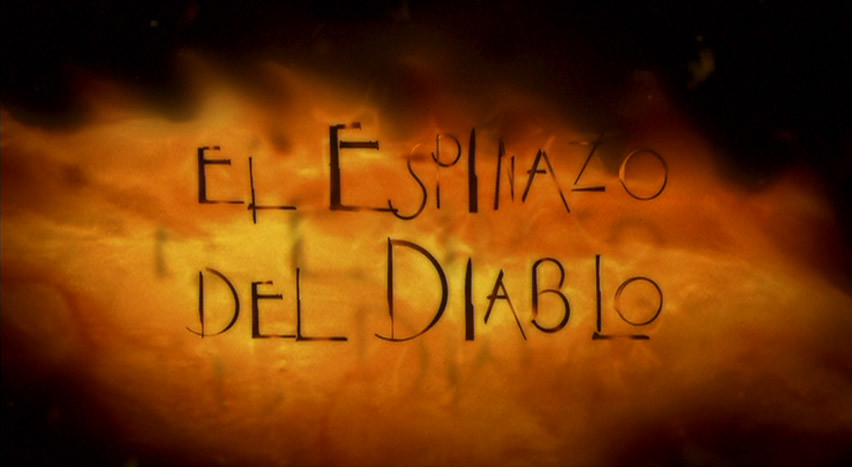
So here's the thing. I'm of the controversial opinion that Pan's Labyrinth isn't a terribly good movie. I'm of the opinion that it's very, very pretty, but the characters are one-dimensional plot-devices, and the story rendered from their drama is more cartoon than fantasy-horror. I have called it on more than one occasion "a flashier, inferior version of The Devil's Backbone," which is only partly fair and yet speaks volumes about where I stand on both. In all honesty, I kind of feel like Guillermo del Toro is the Mexican George Lucas -- in that his best work is underfunded and going against the grain, when he is challenged by either logistical and financial obstacles or the dramatic ones that come from adapting someone else's work. Given every toy in the toybox and carte blanche to create what he wants, the results become an effects house's wet dream and a dramatist's... well, "nightmare" is putting it a little strong. Suffice it to say it's frustrating as a writer to watch any film where it's abundantly, painfully clear that the director doesn't care about the story or the characters, just so long as whatever's going on is really cool.
Anyway, diatribe aside I feel vindicated in rewatching The Devil's Backbone because it's very, very good, and it's very, very strong in character-driven action. In fact, although it's clearly a ghost story with horror elements, the movie is so character driven that it doesn't feel like a horror film at all, it just feels like straight drama with some spooky-ish ghost stuff. As the characters develop into their roles and relationships, as Jacinto becomes an outed villain and the boys are left (basically) to defend themselves, the story just takes on the arc and tone of any old drama story. People's pasts haunt them; people's weaknesses must be overcome; people's fears must be faced head-on. Undead or no, this isn't a story about supernatural things. It's a story about these kids. This is an object lesson for me, no question. This is a lesson I cannot ignore.
And here's another lesson I cannot ignore: The Devil's Backbone isn't light on theme, by any means (and oh man I love love love that unexploded bomb in the courtyard of the orphanage; just the most poetic and wonderful motherfucking elephant-in-the-room ever, reminding the viewer about the world outside as well as the world inside these characters -- speaking on so many unspoken levels at once: it's perfect). But it's also not very complicated, thematically. At a certain point in the story I began to feel a little liberated from my self-imposed burden of "figuring out what my story is about" on some deeper level, because I realize I've always known, basically, but I kept looking for something more, or bigger, or bolder, to say or do with it. Now listen, I know me, and by the time the words go to the page, and by the time I am on the third or fourth draft especially, I may have come full circle on the theme thing and found complicated things my film is saying. But that's fine! I still need to remember, now at least, to relax that hold and worry more about the characters and the drama. (When I say theme I don't mean any dialectic message or brow-beating pretentious agenda; John August calls it the story's "DNA," something that makes every scene of every film feel like it belongs inside that film and no other, something that makes the film its own living thing, maybe. Call it what you will, I use "theme" as an easier to conceive handle for the idea of my story's DNA.) A story with no theme (or "DNA") is, in my mind, no good at all, a waste of everyone's time and effort. If it means nothing, says nothing, is about nothing, and has no connective meaning then it shouldn't exist. It's chewing on styrofoam for nutrients. But many, many good stories have light, breezy themes (or DNA), and focus instead on the drama. And The Devil's Backbone isn't even that breezy: it's just not wearing its "theme" on its sleeve, and it's better for it. My poorly-made point is, I know I'm already far enough down that road that I should just let go, write it out, and look back over it with an eye for "finding the DNA" and extracting it, expanding it, manifesting it. My poorly-made point is, about halfway through watching this I felt kind of elated about the state of affairs w.r.t. my script and its "thematic voice." That's not the most important part, so stop worrying about it.
Yeah, this isn't even a ramble... it's more of a jumble. Anyway, three thoughts: 1, Del Toro's carte blanche works (Pan's Labyrinth, Hellboy II come to mind) are so much weaker than his boxed-in, forced-to-be-creative work (like The Devil's Backbone or, honestly? the first Hellboy); and 2, character-driven stories are basically just dramas, which is liberating to realize (I'm reminded of the great genre stories ranging from Ghostbusters to 28 Days Later to Back to the Future to, hell, Galaxy Quest: they all play out basically as character-driven dramas by act three); and then 3, theme is crucial but a hint of a theme is enough seed to start growing, so stop stressin' and just start.

No comments:
Post a Comment